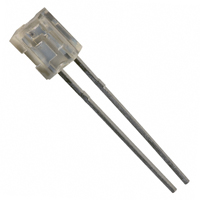Vertical Cavity Surface Emitting Laser in Lateral Package
OPV380
• • • • • 850nm VCSEL technology High thermal stability Low drive current High output power Flat lens package
The OPV380 is a Vertical Cavity Surface Emitting Laser (VCSEL) packaged in a flat lens lateral package. VCSELs offer many advantages in sensing applications when compared to infrared LEDs. These devices require substantially lower drive currents to obtain the same amount of output power as LEDs. This feature allows VCSELs to be used in low power consumption applications such as battery operated equipment. The flat lens packaging allows the device to be used with secondary optics to create custom beam profiles. The OPV380 is optically and spectrally compatible with Optek’s standard detector products such as the OP550 series phototransistors, OP530 series photodarlingtons and the OP900 series photodiodes.
Applications • • • • Non-contact position sensing Photoelectric sensors Optical encoders Light curtains
Emission Surface
VCSEL
Additional laser safety information can be found on the Optek website. See application bulletin #221. Classification is not marked on the device due to space limitations. See package outline for centerline of optical radiance. Operating devices beyond maximum rating may result in hazardous radiation exposure.
1
2
Pb
RoHS
A subsidiary of TT electronics plc
Optek reserves the right to make changes at any time in order to improve design and to supply the best product possible. OPTEK Technology Inc.— 1645 Wallace Drive, Carrollton, Texas 75006 Phone: (800) 341-4747 FAX: (972) 323– 2396 sensors@optekinc.com www.optekinc.com
�VCSEL in Flat Lens Lateral Package
OPV380
Absolute Maximum Ratings
TA = 25o C unless otherwise noted
Storage Temperature Range Operating Temperature Range Lead Soldering Temperature [1/16 inch (1.6mm) from case for 5 sec with soldering iron] Maximum Forward Peak Current Maximum Reverse Voltage -40° to +100° C -40° to +85° C 260° C(1) 20 mA 5V
Electrical Characteristics (TA = 25°C unless otherwise noted)
SYMBOL
POT ITH VF IR RS η λ ∆λ θ ∆η/∆T ∆λ/∆T ∆lTH/∆T ∆VF/∆T
PARAMETER
Total Power Out Threshold Current Forward Voltage Reverse Current Series Resistance Slope Efficiency W avelength Optical Bandwidth Beam Divergence Temp Coefficient of Slope Efficiency Temp Coefficient of Wavelength Temp Coefficient of Threshold Current Temp Coefficient for Forward Voltage
MIN
1.5
TYP
MAX
UNITS
mW
CONDITIONS
IF = 7 mA Note 2 IF = 7 mA VR = 5 V Note 3 Note 4
3.0 2.2 100 20 0.28 830 0.85 20 -0.50 0.06 ±1.0 -2.5 860 55
mA V nA ohms mW/mA nm nm Degrees %/°C nm/°C mA mV/°C
(0° - 70°C), Note 4 (0° - 70°C) (0° - 70°C), Note 2 (0° - 70°C)
NOTES: (1) RMA flux is recommended. Solder dwell time can be increased to 10 seconds when flow soldering. (2) Threshold Current is based on the two line intersection method specified in Telcordia GR-468-Core. Line 1 from 4 mA to 6 mA. Line 2 from 0 mA to 0.5 mA. (3) Series Resistance is the slope of the Voltage-Current line from 5 to 8 mA. (4) Slope efficiency, is the slope of the best fit LI line from 5 mA to 8 mA with 0.25mA test intervals.
Typical Angular Output 100% 200%
Normalized Output Power vs. Forward Current
Normalized at 7mA, 25°C
60%
Normalized Output Power
80% Relative Output
100%
40%
20%
0% -90
-60
-30
0
30
60
90
0% 0
2
4
6
8
10
12
Angular Displacement—Degrees
OPTEK Technology Inc.— 1645 Wallace Drive, Carrollton, Texas 75006 Phone: (800) 341-4747 FAX: (972) 323– 2396 sensors@optekinc.com www.optekinc.com
Forward Current—mA
Issue 1.1 05.05 Page 2 of 2
�
很抱歉,暂时无法提供与“OPV380”相匹配的价格&库存,您可以联系我们找货
免费人工找货